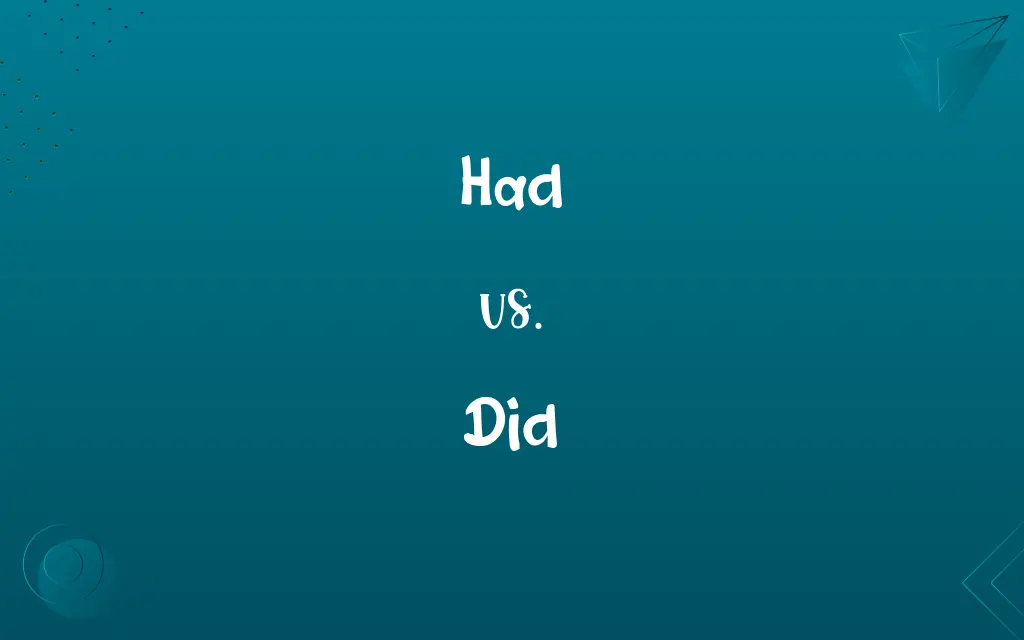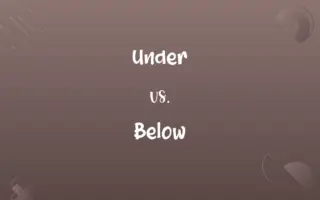Had vs. Did: Know the Difference

By Shumaila Saeed || Published on December 31, 2023
"Had" is the past tense and past participle of "have," indicating possession or necessity, whereas "Did" is the past tense of "do," used to denote action or activity.

Key Differences
Had is used to signify possession, as in owning or holding something in the past. For instance, "She had a car." Did, on the other hand, is utilized to describe an action that was completed in the past, such as "He did the work yesterday." Both are past-tense verbs, but their uses and meanings differ significantly.
Shumaila Saeed
Dec 31, 2023
In the context of perfect tenses, had serves as an auxiliary verb, forming past perfect tense. Example: "They had finished before we arrived." Conversely, did is used as an emphatic auxiliary in questions and negative sentences in the simple past tense, like "Did you see that?" or "I did not understand."
Shumaila Saeed
Dec 31, 2023
Had can also indicate a necessity or requirement that was applicable in the past, often in conditional sentences. For instance, "If I had known, I would have acted differently." Did, however, is often used to emphasize a past action, especially when responding affirmatively to a question. Example: "Yes, I did complete the assignment."
Shumaila Saeed
Dec 31, 2023
Had can also form part of a past perfect continuous tense, indicating an action that was ongoing in the past. Example: "She had been waiting for hours." In contrast, Did is used to form the simple past tense of regular verbs. For example, "They did play football last weekend," emphasizes the action of playing.
Shumaila Saeed
Dec 31, 2023
The use of had is often linked to expressions of time, such as "by the time," "before," or "after" in complex sentences. Example: "He had left by the time I arrived." Did, however, is frequently used in interrogative and negative constructions in the simple past tense. For instance, "Did you go to the party?" or "He did not go to the office yesterday."
Shumaila Saeed
Dec 31, 2023
ADVERTISEMENT
Comparison Chart
Basic Function
Past tense of "have," denotes possession or need
Past tense of "do," denotes action or activity
Shumaila Saeed
Dec 31, 2023
Use in Tenses
Forms past perfect and past perfect continuous
Forms simple past, used for emphasis
Shumaila Saeed
Dec 31, 2023
Context of Use
Necessity, possession, conditional situations
Action, affirmative response, questions, negations
Shumaila Saeed
Dec 31, 2023
Example Sentence Structure
"They had completed the task."
"Did you see the movie?"
Shumaila Saeed
Dec 31, 2023
Emphasis
On past possession or requirement
On past actions, often used for emphasis in speech
Shumaila Saeed
Dec 31, 2023
ADVERTISEMENT
Had and Did Definitions
ADVERTISEMENT
Had
Simple past tense and past participle of have|cap=1.
This morning I had an egg for breakfast.
A good time was had by all.
Shumaila Saeed
Dec 13, 2023
Had
Used to form the past perfect tense, expressing an action that took place prior to a reference point that is itself in the past.
I felt sure that I had seen him before.
Shumaila Saeed
Dec 13, 2023
Had
See Have.
And lever me is be pore and trewe.[And more agreeable to me it is to be poor and true.]
Him had been lever to be syke.[To him it had been preferable to be sick.]
For him was lever have at his bed's headTwenty bookes, clad in black or red, . . . Than robes rich, or fithel, or gay sawtrie.
Poor lady, she were better love a dream.
You were best hang yourself.
Me rather had my heart might feel your loveThan my unpleased eye see your courtesy.
I hadde levere than my scherte,That ye hadde rad his legende, as have I.
I had as lief not be as live to beIn awe of such a thing as I myself.
I had rather be a dog and bay the moon,Than such a Roman.
I had rather be a doorkeeper in the house of my God, than to dwell in the tents of wickedness.
Shumaila Saeed
Dec 13, 2023
Repeatedly Asked Queries
How is 'had' used in perfect tenses?
As an auxiliary verb to form past perfect tenses.
Shumaila Saeed
Dec 31, 2023
Is 'had' always about ownership?
Mostly, but it can also suggest past necessity.
Shumaila Saeed
Dec 31, 2023
What is the function of 'did'?
It denotes an action or activity in the past.
Shumaila Saeed
Dec 31, 2023
Can 'had' indicate a past action?
Yes, particularly in the past perfect tense.
Shumaila Saeed
Dec 31, 2023
What is the interrogative use of 'did'?
Used in forming questions in the past tense.
Shumaila Saeed
Dec 31, 2023
Does 'had' appear in conditional sentences?
Yes, often to indicate a past condition.
Shumaila Saeed
Dec 31, 2023
Is 'had' used for duration?
Yes, in contexts like "had been doing something."
Shumaila Saeed
Dec 31, 2023
Can 'had' form complex sentences?
Yes, especially in past perfect constructions.
Shumaila Saeed
Dec 31, 2023
Does 'did' conjugate regular verbs?
Yes, it's used in the past tense for regular verbs.
Shumaila Saeed
Dec 31, 2023
Is 'did' only for past actions?
Primarily, it denotes past activities or actions.
Shumaila Saeed
Dec 31, 2023
Are 'had' and 'did' interchangeable?
No, they serve different grammatical purposes.
Shumaila Saeed
Dec 31, 2023
Does 'did' always need a subject?
Yes, it requires a subject to form a complete sentence.
Shumaila Saeed
Dec 31, 2023
What's the difference in emphasis between 'had' and 'did'?
'Had' emphasizes past possession or necessity; 'did' emphasizes past actions.
Shumaila Saeed
Dec 31, 2023
How does 'had' relate to time?
Often linked with expressions like "before" or "by the time."
Shumaila Saeed
Dec 31, 2023
Is 'did' used in formal writing?
Yes, particularly in past tense narratives.
Shumaila Saeed
Dec 31, 2023
Can 'had' be omitted in some sentences?
Yes, in casual speech, but it changes the tense.
Shumaila Saeed
Dec 31, 2023
Share this page
Link for your blog / website
HTML
Link to share via messenger
About Author
Written by
Shumaila SaeedShumaila Saeed, an expert content creator with 6 years of experience, specializes in distilling complex topics into easily digestible comparisons, shining a light on the nuances that both inform and educate readers with clarity and accuracy.









































































